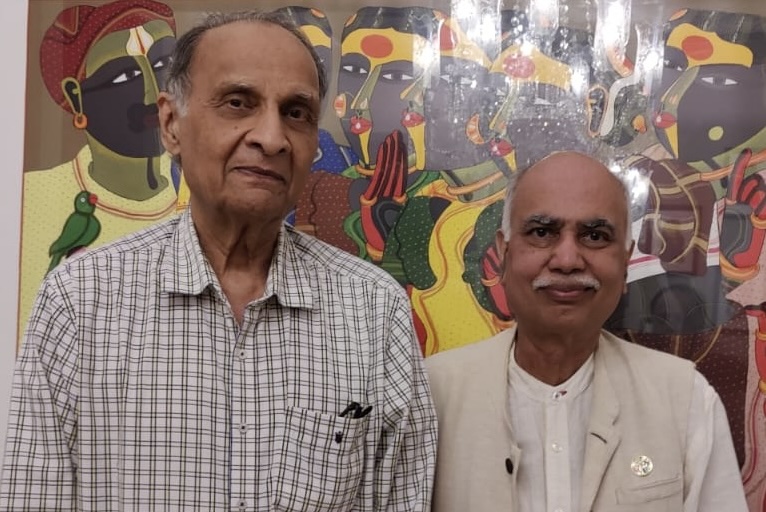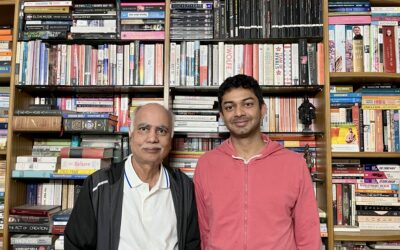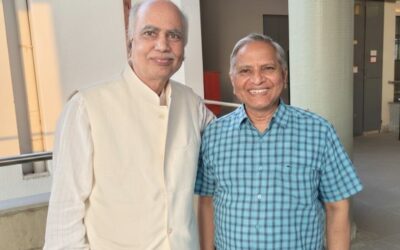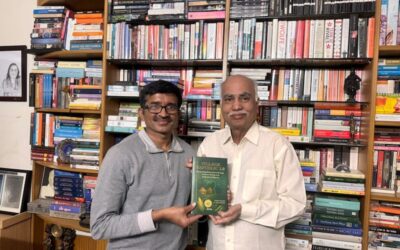
The Soul of Sustainable Chemistry
There are evenings when conversation lingers like the aftertaste of cardamom tea—subtle yet insistent. Last night was one of them. Eminent chemist and my long-standing friend, Dr. S. Chandrasekhar, hosted some of his dear scientist friends, and I had the honour of being one among them. The day was doubly special, it being his father-in-law’s 96th birth anniversary and the release of a book written by his wife, Srivari Amresam Bharati.
At dinner, across the white cloth, an authentic Telugu thali, and the dim light of a Hyderabadi chandelier, I asked Professor Goverdhan Mehta, a world-renowned chemist and teacher of generations, what he would like to be remembered for.
Without hesitation, he replied, “For pioneering sustainable chemistry.”
The words hung in the air, not as self-praise, but as a declaration of what chemistry must become. For a moment, the room seemed to shrink, every voice folding into silence. Here was a man who had lived through the revolutions of twentieth-century science—who had mastered the elegance of organic synthesis, led institutions, and carried India’s scientific reputation abroad—yet, at the twilight of an extraordinary career, he placed his legacy, not in molecules crafted, but in a principle embodied—that chemistry, to endure, must be sustainable.
Born in Jodhpur in 1943 and raised in the dawn of independent India, Goverdhan Mehta was part of a generation that saw in science not merely discovery but emancipation. His journey carried him from Rajasthan to the University of Poona (now SPPU), and then to the United States, before returning home with a restless ambition: to put Indian chemistry on the world map.
And he did. His research in organic synthesis became legendary, particularly his mastery of natural product synthesis. He crafted elaborate molecular architectures that nature had perfected over millions of years—alkaloids, terpenoids and complex polycyclic structures.
One of his celebrated achievements was the synthesis of steroids and terpenoids with unusual ring systems. These were not just exercises in intellectual dexterity, but also blueprints for medicinal chemistry, offering scaffolds that could inspire the development of new drugs. His strategies in synthesising indole alkaloids—molecules that plants deploy for defence and humans now explore for therapy—set new benchmarks in creativity.
Yet what strikes one, meeting him now, is not the glitter of recognition but the steady flame of inquiry. His curiosity has not waned, only deepened, bending itself to a new question: What does it mean for chemistry to serve life, not just knowledge?
A chemist of the twentieth century, triumphant in technique, sought efficiency. Could reactions be faster, yields higher, and steps fewer? This was the grammar of progress, and Mehta mastered it as few did. However, the twenty-first century presents another grammar before us, one that asks not only how well but also at what cost. A reaction that is efficient yet toxic, a process that is streamlined yet wasteful, a molecule that is brilliant yet persistent in soil and sea—these are pyrrhic victories.
“A 21st-century chemist,” Prof. Mehta said, “must not be satisfied only if a reaction is efficient; he or she must also examine: Is it ethical, renewable and regenerative?”
This Trinity is the soul of sustainable chemistry, and perhaps of Prof. Mehta’s own philosophy. In sustainable chemistry, the defining characteristic is the life-cycle gaze. It is no longer enough to measure atoms and bonds in a flask. One must follow them outward, into mines where raw materials are extracted, factories where energy is consumed, households where products are used and oceans into which residues drift.
Prof. Mehta, though celebrated for elegant syntheses, is among those who remind chemists that elegance in the flask must also translate into responsibility in the field. He supported ideas of atom economy—maximising how much of the raw material ends up in the final product—as a criterion of excellence. He spoke of green solvents, of avoiding heavy metals, and of catalytic processes that required less energy.
In his later lectures, Prof. Mehta often urged students to think beyond molecules, encouraging them to see chemistry as embedded in climate change, energy transitions, sustainable agriculture and circular economies. His own research group began exploring methodologies that reduced chemical waste, integrated renewable feedstocks and aligned synthesis with sustainability goals. Chemistry becomes a musical piece that has a beginning, a middle and an end. Sustainable chemistry requires that each chapter be written with foresight—that no toxic legacy be left for future generations.
There is something deeply Indian in this vision. Rta, the concept of cosmic order, requires balance: what is taken must be returned. In villages, waste turns into compost; in rituals, fire sends offerings back into the air. Perhaps it is no accident that an Indian chemist should insist on sustainability. For what India taught the world through philosophy, she must now demonstrate through science.
Prof. Mehta’s own career is a testament to this bridging. From the sandstone streets of Jodhpur to laboratories across continents, he has lived at the intersection of tradition and modernity. He carries, one feels, the humility of a teacher and the boldness of a pioneer—qualities required for India’s scientific renaissance.
Why should this matter now, when the world reels with more visible crises like pandemics, wars, and inequities? Because chemistry is everywhere, silently shaping the conditions of life. Plastic in oceans, pesticides in soils, pharmaceuticals in rivers—all are chemical legacies. To change chemistry is to change destiny.
The climate crisis, too, is, at its heart, a chemical crisis. Fossil carbon, buried for aeons, is now combusted into the sky. Sustainable chemistry seeks alternatives: solar-driven reactions, biodegradable polymers, and biocatalysts inspired by enzymes. It seeks not only to reduce harm but to reimagine abundance.
As I recall the dinner, I find myself drifting into the stream of thought that folds inwards and outwards: how strange that bonds invisible bind us to futures we will not see; how fragile the margins of discovery, where genius and responsibility must meet; how urgent the demand that science be not only clever but kind. I think of Prof. Mehta, his face charming and serene, his voice soft and calm, his words deliberate, and wonder if this is what legacy means—not monuments nor medals, but the transmission of a question that refuses to die: How shall we live well with the Earth?
To young researchers, his message is clear. Learn your reactions, perfect your yields, but never stop asking the deeper questions. The laboratory is not sealed off from the world; every flask is connected to forests, rivers and skies. When you choose a solvent, you also choose a future. The call is not to renounce chemistry but to deepen it—to infuse it with ethics, renewal and regeneration. In doing so, chemistry becomes not the destroyer of worlds but their healer.
And so, from a single dinner table, an evening conversation stretches outward. Prof. Goverdhan Mehta will be remembered as a master chemist, no doubt. His synthetic pathways will be cited in journals, and his students will recall his rigour. But if he has his wish, he will be remembered above all for pioneering sustainable chemistry—for insisting that the craft of molecules be the craft of care. To be remembered thus is to place one’s name not in stone but in soil, where it nourishes unseen roots. And perhaps that is the truest immortality a scientist can hope for.
MORE FROM THE BLOG
From Disease to Wellness: Time for a Paradigm Shift
Modern medicine is magnificent at one thing: it rushes heroically to the battlefield after the war has already been lost. When the coronary artery is blocked, a stent is inserted. When the pancreas fails, insulin is administered. When cancer erupts, it deploys...
A Hero’s Journey of Taking Cognition Beyond Mortal Neurons
In an age mesmerised by rankings, metrics, and loud declarations of success, the most consequential journeys often unfold quietly. They are not propelled by brilliance alone, but by curiosity, humility, and an unyielding fidelity to truth. The exploration of...
Science, Service, and the Long Goodbye to Leprosy
It was already evening when they arrived, and I sensed a good feeling. The light had softened, retreating gently from the edges of objects, as though the day itself wished to listen to what came next. Dr. Gangadhar Sunkara came with Dr. Chinnababu Sunkavalli—both...




When we grew up as researchers, in chemistry in early nineties, few persons like Professor Goverdhan Mehta were sources of inspiration and role models for many of us. I had an opportunity to know more about him from one of my friend who was his PhD student. The concept of green chemistry was taking off when we started own research in the late nineties. In 2001, there was an IUPAC-sponsored international symposium on green chemistry was held in Delhi presided by Professor Mehta, the then Director of IISc, where I presented a humble poster. I was fondly surprised to listen to Ms. Sheela Dixit’s (the then CM of Delhi) extempore on green economy. With time, sustainable chemistry has taken over. Now the UN talks about sustainable development goal (SDG). Yes, sustainable, or at least, near-sustainable chemical processes are must for sustainable earth or sustainable nature. Thanks to Dr. Tiwari (my Arun Dada) for letting us know that Prof. Mehta continued the string. And, Professor Mehta must be happy that there are many chemistry researchers, including this struggling poor fellow, who are not only taking forward sustainability in chemistry but also bringing inclusivity to sustainable chemistry. May Professor Mehta have a good health and continue to be a guiding light for thousands of chemists of the nation.
Respected Dr Tiwari Ji, I had the opportunity to interact with Prof Goverdhan Mehta on a few occasions, and he was very encouraging. Apart from being a pioneering chemist, I found him pleasant and always smiling. Hope to have more interaction with him in the near future as well.
Brilliant blog Prof Tiwariji, on commendable contributions of the luminary of green chemistry!
His legacy of exploring sustainable pathways in chemistry to serve life will endure for generations to come!!
Thank you Sir for sharing this wonderful blog!
Your conversation with Prof. Mehta reminds us that true scientific greatness lies not only in discovery, but in responsibility.
To not just ask a question, but take full responsibility for the discovery and the mark that it will leave on this world.
This is especially important for younger generations to come and it makes me reflect on how I can take this vision forward, in the field of medicine, in my lab working on cellular therapies.
It is your blogs like these that open my mind to broaden my thinking, to think about our environment as a whole and apply the concept of sustainability in everything I do.
Prof Tiwari, Thank you for getting involved in celebrating chemistry through the work of Prof Goverdhan Mehta! ‘Sustainable chemistry requires that each chapter be written with foresight—that no toxic legacy be left for future generations’. The best way to go!
Sustainable chemistry takes me to ecstatic depths of philosophy.Let’s not stop at chemistry.For the ease of study our forefathers made division of human knowledge.It’s about mother nature.Every one from his end trying to understand nature.The essence is our nature should be sustainable, renewable.In our greed we are destroying nature and hope of sustainability.Do we look at nature beyond our needs today?How many our brothers enjoying fruits of development?To what end our journey? Let’s see dream a day when everyone contributes his share towards collective well-being,get according to his needs.
Dear Sir, Greetings! Your reflections on Professor Mehta’s vision of sustainable chemistry reminded me of a verse from the Bhagavad Gita: युक्ताहारविहारस्य युक्तचेष्टस्य कर्मसु (6.17) — true harmony lies in balance in all that we consume and all that we do. Just as Lord Krishna teaches that every action must be done with awareness of its larger impact, sustainable chemistry calls us to look beyond the flask, to the forests, rivers, and skies. To me, this is karma-yoga in science — doing one’s duty with skill, but also with care for creation. It is inspiring to see how tradition and modernity meet in this vision, where scientific rigour is united with dharmic responsibility. Warm Regards,
As a school student, I was taught to ask ‘why’ to increase the breadth and depth of knowledge.
I was also taught that Socrates encouraged his disciples to ask why.
This spirit of inquiry was later imbibed by Dr Kalam in his numerous review meetings to break technological barriers.
It is heartening to know that there are people are who still practice the spirit.
I sincerely wish the students of today and all of us follow this spirit.
Best wishes to all.
In my humble view..sustainable chemistry should be the next research forefront…we have seen whole lot of polluting chemistry. Now is the time to reverse the process.
Being a farmer I noticed one nice thing in your article…plants already use indols for protection and humans are not discovering it as medicines!!!
The narrative moves gracefully from the intimacy of a dinner conversation to the vastness of humanity’s responsibility toward the Earth. It not only honours a great scientist but also reminds readers (whether scientists or not)that sustainability is not a choice but a duty. Truly inspiring, and written with such lyrical elegance that one feels both informed and moved.
Beautifully written sir. You have captured not only the brilliance of Prof. Mehta’s technical mastery but also the moral vision. It shows true legacy is not just in the molecules he created but the values he stood for- making chemistry sustainable, ethical. A powerful message for young scientists, that real progress isn’t just about efficiency but also about responsibility.
Thank you for this wonderful article Arun ji As someone working in healthcare, I can see how sustainable chemistry directly impacts human well-being. Your words resonate deeply with both science and society.”
Arunji, Nice and reflective piece of writing. The quiet power of Prof. Mehta’s words and your evocative narration remind us that the true legacy of science lies not just in innovation, but in intention. Sustainable chemistry isn’t just the future—it’s the responsibility
Dear Prof
This is a powerful testimony of a great scientist! Science exists to impact man and development positively and sustainably
It’s an inspiration to all scientists and should be emulated. .
Thank you for sharing your time with Prof Mehta and lessons drawn for his life’s work.